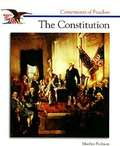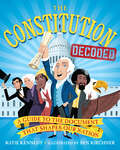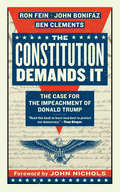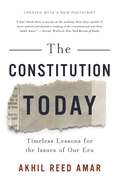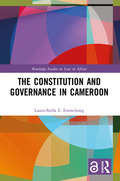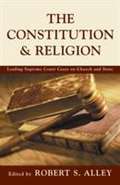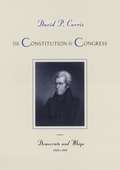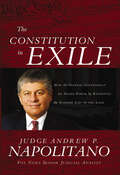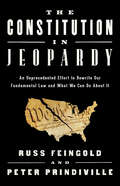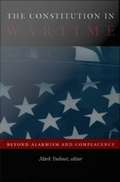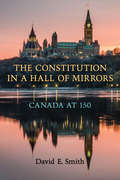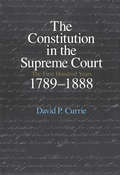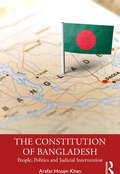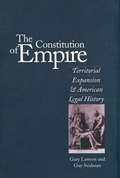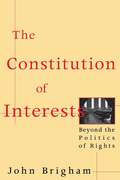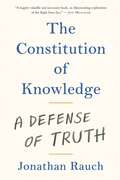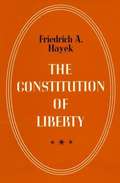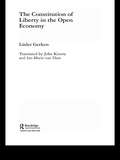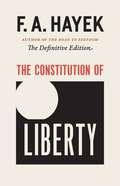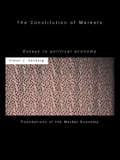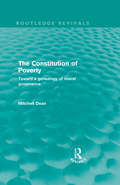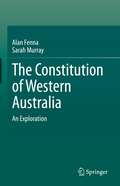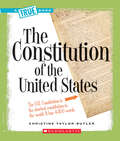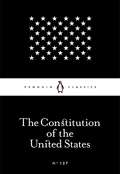- Table View
- List View
The Constitution (Cornerstones of Freedom)
by Marilyn ProlmanIf the men who met at the Constitutional Convention were alive today, they would no doubt be proud of the results of their work. Democracy in the United States has become the form of government that is most often copied around the world. The 1990s present an entirely different world than that of the 1770s. Computers, telephones, satellite communications, nuclear weapons, and modern medicine create conditions that the delegates could not have imagined in 1787. Nevertheless, the basic principles set forth in the United States Constitution still guide the nation as every new age dawns.
The Constitution Decoded: A Guide to the Document That Shapes Our Nation
by Katie KennedyThe ultimate guide to the US Constitution—and the history of the US through the law of the land—for middle grade readers ages 10+. The book decodes the original document with a direct translation of the text, dissecting every word, phrase and idea. Then it connects the document to major historical figures and events using full-color illustrations and examples of how the document works in practice.
The Constitution Demands It: The Case for the Impeachment of Donald Trump
by John Nichols Ben Clements Ron Fein John Bonifaz"Read this book and learn how best to protect our democracy." --Tom Steyer, founder of NeedToImpeach.org The reasons Donald Trump must be impeached — as per the Founding Fathers — and what you can do to help make that happenThree veteran constitutional attorneys say there’s no way around it: The Constitution demands that Donald Trump must be impeached. And in clear language using compelling logic rooted firmly in the Constitution, they detail why the time to start is now—not in the indefinite future after criminal investigations have ended. In fact, much of Trump’s impeachable conduct lies outside the scope of ongoing federal criminal investigations. Citing charges such as accepting illegal payments from foreign governments, using government agencies to persecute political enemies, obstructing justice, abusing the pardon power, and the undermining freedom of the press, they provide the factual and legal basis for eight articles of impeachment. In short, they argue, abuses threatening our constitutional democracy should be dealt with by the remedy that the Constitution provides for a lawless, authoritarian president: impeachment. And an informed citizenry should be part of the process. After all, they say, impeachment is not a constitutional crisis — impeachment is the cure for a constitutional crisis.
The Constitution Today: Timeless Lessons for the Issues of Our Era
by Akhil Reed AmarA leading legal scholar addresses the most important constitutional controversies of the past two decades and illuminates the Constitution's spirit and ongoing relevanceWhen the stories that lead our daily news involve momentous constitutional questions, present-minded journalists and busy citizens cannot always see the stakes clearly. In The Constitution Today, Akhil Reed Amar, America's preeminent constitutional scholar, considers the biggest and most bitterly contested debates of the last two decades—from gun control to gay marriage, affirmative action to criminal procedure, presidential dynasties to Congressional dysfunction, Bill Clinton's impeachment to Obamacare. He shows how the Constitution's text, history, and structure are a crucial repository of collective wisdom, providing specific rules and grand themes relevant to every organ of the American body politic.Leading readers through the particular constitutional questions at stake in each episode while outlining his abiding views regarding the Constitution's letter, its spirit, and the direction constitutional law must go, Amar offers an essential guide for anyone seeking to understand America's Constitution and its relevance today.
The Constitution and Governance in Cameroon (Routledge Studies on Law in Africa)
by Laura-Stella E. EnonchongThis book provides a systematic analysis of the major structural and institutional governance mechanisms in Cameroon, critically analysing the constitutional and legislative texts on Cameroon’s semi-presidential system, the electoral system, the legislature, the judiciary, the Constitutional Council and the National Commission on Human Rights and Freedoms. The author offers an assessment of the practical application of the laws regulating constitutional institutions and how they impact on governance. To lay the groundwork for the analysis, the book examines the historical, constitutional and political context of governance in Cameroon, from independence and reunification in 1960–1961, through the adoption of the 1996 Constitution, to more recent events including the current Anglophone crisis. Offering novel insights on new institutions such as the Senate and the Constitutional Council and their contribution to the democratic advancement of Cameroon, the book also provides the first critical assessment of the legislative provisions carving out a special autonomy status for the two Anglophone regions of Cameroon and considers how far these provisions go to resolve the Anglophone Problem. This book will be of interest to scholars of public law, legal history and African politics.
The Constitution and Religion: Leading Supreme Court Cases on Church and State
by Robert S. AlleyA comprehensive look at the Supreme Court's decisions regarding the separation of Church and State.
The Constitution in Congress: Democrats and Whigs 1829-1861
by David P. CurrieThe Constitution in Congress series has been called nothing less than a biography of the US Constitution for its in-depth examination of the role that the legislative and executive branches have played in the development of constitutional interpretation. This third volume in the series, the early installments of which dealt with the Federalist and Jeffersonian eras, continues this examination with the Jacksonian revolution of 1829 and subsequent efforts by Democrats to dismantle Henry Clay's celebrated "American System" of nationalist economics. David P. Currie covers the political events of the period leading up to the start of the Civil War, showing how the slavery question, although seldom overtly discussed in the debates included in this volume, underlies the Southern insistence on strict interpretation of federal powers. Like its predecessors, The Constitution in Congress: Democrats and Whigs will be an invaluable reference for legal scholars and constitutional historians alike.
The Constitution in Exile: How the Federal Government Has Seized Power by Rewriting the Supreme Law of the Land
by Andrew P. NapolitanoWhat ever happened to our inalienable rights?The Constitution was once the bedrock of our country, an unpretentious parchment that boldly established the God-given rights and freedoms of America. Today that parchment has been shred to ribbons, explains Fox News senior judicial analyst Judge Andrew P. Napolitano, as the federal government trounces state and individual rights and expands its reach far beyond what the Framers intended.An important follow-up to Judge Napolitano's best-selling Constitutional Chaos, this book shows with no-nonsense clarity how Congress has "purchased" regulations by bribing states and explains how the Supreme Court has devised historically inaccurate, logically inconsistent, and even laughable justifications to approve what Congress has done. It's an exciting excursion into the dark corners of the law, showing how do-gooders, busybodies, and control freaks in government disregard the limitations imposed upon Congress by the Constitution and enact laws, illegal and unnatural, in virtually every area of human endeavor. Praise for The Constitution in Exile from Left, Right, and Center"Does anyone understand the vision of America's founding fathers? The courts and Congress apparently don't have a clue. But Judge Andrew P. Napolitano does, and so will you, if you read The Constitution in Exile."-BILL O'REILLY"Whatever happened to states rights, limited government, and natural law? Judge Napolitano, in his own inimitable style, takes us on a fascinating tour of the destruction of constitutional government. If you want to know how the federal government got so big and fat, read this book. Agree or disagree, this book will make you think."-SEAN HANNITY"In all of the American media, Judge Andrew P. Napolitano is the most persistent, uncompromising guardian of both the letter and the spirit of the Constitution, very much including the Bill of Rights. Increasingly, our Constitution is in clear and present danger. Judge Napolitano--in The Constitution in Exile--has challenged all Americans across party lines to learn the extent of this constitutional crisis." -NAT HENTOFF"Judge Napolitano engages here in what I do every day on my program-make you think. There's no question that potential Supreme Court nominees and what our Constitution says and doesn't say played a major role for many voters in our last couple of elections. What the judge does here is detail why the federal government claims it can regulate as well as tax everything in sight as it grows and grows. Agree or disagree with him-you need to read his latest book, think, and begin to arm yourself as you enter this important debate." -RUSH LIMBAUGH"At a time when we are, in Benjamin Franklin's words, sacrificing essential liberty to purchase a little temporary safety, here comes the judge with what should be mandatory reading for the executive branch cronies who are busy stealing power while they think we're not watching. Thank goodness the judge is watching and speaking truth to power. More than a book, this is an emergency call to philosophical arms, one we must heed before it's too late." -ALAN COLMES
The Constitution in Jeopardy: An Unprecedented Effort to Rewrite Our Fundamental Law and What We Can Do About It
by Russ Feingold Peter PrindivilleA former U.S. senator joins a legal scholar to examine a hushed effort to radically change our Constitution, offering a warning and a way forward.Over the last two decades, a fringe plan to call a convention under the Constitution's amendment mechanism—the nation's first ever—has inched through statehouses. Delegates, like those in Philadelphia two centuries ago, would exercise nearly unlimited authority to draft changes to our fundamental law, potentially altering anything from voting and free speech rights to regulatory and foreign policy powers. Such a watershed moment would present great danger, and for some, great power.In this important book, Feingold and Prindiville distill extensive legal and historical research and examine the grave risks inherent in this effort. But they also consider the role of constitutional amendment in modern life. Though many focus solely on judicial and electoral avenues for change, such an approach is at odds with a cornerstone ideal of the Founding: that the People make constitutional law, directly. In an era defined by faction and rejection of long-held norms, The Constitution in Jeopardy examines the nature of constitutional change and asks urgent questions about what American democracy is, and should be.
The Constitution in Wartime: Beyond Alarmism and Complacency
by Mark TushnetMost recent discussion of the United States Constitution and war--both the war on terrorism and the war in Iraq--has been dominated by two diametrically opposed views: the alarmism of those who see many current policies as portending gross restrictions on American civil liberties, and the complacency of those who see these same policies as entirely reasonable accommodations to the new realities of national security. Whatever their contributions to the public discussion and policy-making processes, these voices contribute little to an understanding of the real constitutional issues raised by war. Providing the historical and legal context needed to assess competing claims, The Constitution in Wartime identifies and explains the complexities of the important constitutional issues brought to the fore by wartime actions and policies. Twelve prominent legal scholars and political scientists combine broad overviews of U. S. history and contemporary policy with detailed yet accessible analyses of legal issues of pressing concern today. Some of the essays are broad in scope, reflecting on national character, patriotism, and political theory; exploring whether war and republican government are compatible; and considering in what sense we can be said to be in wartime circumstances today. Others are more specific, examining the roles of Congress, the presidency, the courts, and the international legal community. Throughout the collection, balanced, unbiased analysis leads to some surprising conclusions, one of which is that wartime conditions have sometimes increased, rather than curtailed, civil rights and civil liberties. For instance, during the cold war, government officials regarded measures aimed at expanding African Americans' freedom at home as crucial to improving America's image abroad. Contributors. Sotirios Barber, Mark Brandon, James E. Fleming, Mark Graber, Samuel Issacharoff, David Luban, Richard H. Pildes, Eric Posner, Peter Spiro, William Michael Treanor, Mark Tushnet, Adrian Vermeule
The Constitution in a Hall of Mirrors: Canada at 150
by David E. SmithWhether it’s the first-past-the-post electoral system or partisan government appointees to the Senate, Canadians want better representation and accountability from the federal government. Before reforms can be enacted, however, it is important to explore and clarify the relationships among Canada’s three parliamentary institutions: Crown, Senate, and Commons. In The Constitution in a Hall of Mirrors, David E. Smith presents a learned but accessible analysis of the interconnectedness of Canada’s parliamentary institutions. Smith argues that Parliament is a unity comprised of three parts and any reforms made to one branch will, whether intended or not, affect the other branches. Through a timely, nuanced, and comprehensive examination of parliamentary debates, committee reports, legal scholarship, and comparative analysis of developments in the United Kingdom, Smith uncovers the substantial degree of ambiguity that exists among Canadians and their calls for structural and operational reforms. By illuminating the symbiotic relationship between the Crown, Senate, and Commons, The Constitution in a Hall of Mirrors brings government reform closer to reality.
The Constitution in the Supreme Court: The First Hundred Years, 1789–1888
by David P. CurrieCurrie's masterful synthesis of legal analysis and narrative history, gives us a sophisticated and much-needed evaluation of the Supreme Court's first hundred years. "A thorough, systematic, and careful assessment. . . . As a reference work for constitutional teachers, it is a gold mine."—Charles A. Lofgren, Constitutional Commentary
The Constitution of Bangladesh: People, Politics and Judicial Intervention
by Arafat Hosen KhanThe book provides a comprehensive introduction to the Constitution of Bangladesh. It traces the sociopolitical and legal context of its birth in the aftermath of a violent Independence War, through to the seventeen amendments to date as Bangladesh evolved through military coups and dictatorships, shifting alliances between religious and political parties, and the emergence of development state. Aimed at readers who are keen to understand the underpinnings of the constitutional system, its evolution, and the politics behind the scenes, the book will explore the impact of political bargains and extra-legal developments on the evolution of the Constitution instead of treating it as a standalone doctrine. By focusing on the overall sociopolitical context up until 2020, the book departs from the dominant tendency in legal scholarship to restrict attention to the development of the Constitution from its inception to the modern day. The volume will be of great interest to scholars and researchers of law, politics and South Asian studies.
The Constitution of Empire: Territorial Expansion and American Legal History
by Gary Lawson Guy SeidmanThe Constitution of Empire offers a constitutional and historical survey of American territorial expansion from the founding era to the present day. The authors describe the Constitution's design for territorial acquisition and governance and examine the ways in which practice over the past two hundred years has diverged from that original vision.
The Constitution of Interests: Beyond the Politics of Rights
by John BrighamMany of America's most important social and political movements--abolition, women's suffragette, civil rights, women's liberation, gay and lesbian rights--have organized in the shadow of the law. All are based in their theoretical opposition to the law. Yet at the same time, they are dependent on the laws that prohibit them. Law is thus formed as much through the dynamic tensions that govern how these laws are received as through their official decree. Legal forms such as contracts, property, and rights also constitute social and political life because they structure our world. John Brigham here focuses on four ideological movements and their strategies, among them the struggle over the closing of gay bathhouses in the early years of the AIDS crisis and the radical feminist use of rage and radical consciousness in anti- pornography campaigns. The effect of law on politics, Brigham convincingly reveals, is pervasive precisely because political life finds its expression in a surprising variety of legal forms.
The Constitution of Knowledge: A Defense of Truth
by Jonathan Rauch“In what could be the timeliest book of the year, Rauch aims to arm his readers to engage with reason in an age of illiberalism.” —Newsweek A New York Times Book Review Editors' Choice Disinformation. Trolling. Conspiracies. Social media pile-ons. Campus intolerance. On the surface, these recent additions to our daily vocabulary appear to have little in common. But together, they are driving an epistemic crisis: a multi-front challenge to America’s ability to distinguish fact from fiction and elevate truth above falsehood. In 2016 Russian trolls and bots nearly drowned the truth in a flood of fake news and conspiracy theories, and Donald Trump and his troll armies continued to do the same. Social media companies struggled to keep up with a flood of falsehoods, and too often didn’t even seem to try. Experts and some public officials began wondering if society was losing its grip on truth itself. Meanwhile, another new phenomenon appeared: “cancel culture.” At the push of a button, those armed with a cellphone could gang up by the thousands on anyone who ran afoul of their sanctimony. In this pathbreaking book, Jonathan Rauch reaches back to the parallel eighteenth-century developments of liberal democracy and science to explain what he calls the “Constitution of Knowledge”—our social system for turning disagreement into truth. By explicating the Constitution of Knowledge and probing the war on reality, Rauch arms defenders of truth with a clearer understanding of what they must protect, why they must do—and how they can do it. His book is a sweeping and readable description of how every American can help defend objective truth and free inquiry from threats as far away as Russia and as close as the cellphone.
The Constitution of Liberty
by Friedrich A. HayekIn this classic work Hayek restates the ideals of freedom that he believes have guided, and must continue to guide, the growth of Western civilization. Hayek's book, first published in 1960, urges us to clarify our beliefs in today's struggle of political ideologies.
The Constitution of Liberty in the Open Economy (Routledge Foundations Of The Market Economy Ser.)
by Luder GerkenIn these heady days of ever increasing globalization it has become vital to question whether governments should be allowed to protect domestic enterprises from foreign competitors.This book represents a first attempt to provide a new conceptual basis for discussing the cases in which free trade should be the option of choice in trade policy and tho
The Constitution of Liberty: The Definitive Edition
by Friedrich A. Hayek edited by Ronald HamowyFrom the $700 billion bailout of the banking industry to president Barack Obama's $787 billion stimulus package to the highly controversial passage of federal health-care reform, conservatives and concerned citizens alike have grown increasingly fearful of big government. Enter Nobel Prize-winning economist and political theorist F. A. Hayek, whose passionate warning against empowering states with greater economic control, The Road to Serfdom, became an overnight sensation last summer when it was endorsed by Glenn Beck. The book has since sold over 150,000 copies. The latest entry in the University of Chicago Press's series of newly edited editions of Hayek's works, The Constitution of Liberty is, like Serfdom, just as relevant to our present moment. The book is considered Hayek's classic statement on the ideals of freedom and liberty, ideals that he believes have guided--and must continue to guide--the growth of Western civilization. Here Hayek defends the principles of a free society, casting a skeptical eye on the growth of the welfare state and examining the challenges to freedom posed by an ever expanding government--as well as its corrosive effect on the creation, preservation, and utilization of knowledge. In opposition to those who call for the state to play a greater role in society, Hayek puts forward a nuanced argument for prudence. Guided by this quality, he elegantly demonstrates that a free market system in a democratic polity--under the rule of law and with strong constitutional protections of individual rights--represents the best chance for the continuing existence of liberty. Striking a balance between skepticism and hope, Hayek's profound insights are timelier and more welcome than ever before. This definitive edition of The Constitution of Liberty will give a new generation the opportunity to learn from his enduring wisdom.
The Constitution of Liberty: The Definitive Edition (The\collected Works Of F. A. Hayek Ser. #17)
by F.A. A. HayekFrom the $700 billion bailout of the banking industry to president Barack Obama’s $787 billion stimulus package to the highly controversial passage of federal health-care reform, conservatives and concerned citizens alike have grown increasingly fearful of big government. Enter Nobel Prize–winning economist and political theorist F. A. Hayek, whose passionate warning against empowering states with greater economic control, The Road to Serfdom, became an overnight sensation last summer when it was endorsed by Glenn Beck. The book has since sold over 150,000 copies.The latest entry in the University of Chicago Press’s series of newly edited editions of Hayek’s works, The Constitution of Liberty is, like Serfdom, just as relevant to our present moment. The book is considered Hayek’s classic statement on the ideals of freedom and liberty, ideals that he believes have guided—and must continue to guide—the growth of Western civilization. Here Hayek defends the principles of a free society, casting a skeptical eye on the growth of the welfare state and examining the challenges to freedom posed by an ever expanding government—as well as its corrosive effect on the creation, preservation, and utilization of knowledge. In opposition to those who call for the state to play a greater role in society, Hayek puts forward a nuanced argument for prudence. Guided by this quality, he elegantly demonstrates that a free market system in a democratic polity—under the rule of law and with strong constitutional protections of individual rights—represents the best chance for the continuing existence of liberty. Striking a balance between skepticism and hope, Hayek’s profound insights are timelier and more welcome than ever before. This definitive edition of The Constitution of Liberty will give a new generation the opportunity to learn from his enduring wisdom.
The Constitution of Markets: Essays in Political Economy (Foundations Of The Market Economy Ser.)
by Viktor J VanbergWhat is the nature and role of competition in markets and politics?This book examines the institutional dimension of markets and the rules and institutions that condition the operation of market economies. Particular attention is paid to the the role of the state, specifically the role of governments in shaping and maintaining the economic constitu
The Constitution of Poverty: Towards a genealogy of liberal governance (Routledge Revivals)
by Mitchell DeanFirst published in 1991, This book looks at how capitalism has affected the organization of the poor. It also explores what the links are between notions of poverty and notions personal responsibility, philanthropy, morality and state forms. An intruiging work for anyone interested in the foundations and long-term progression of the welfare state.
The Constitution of Western Australia: An Exploration
by Sarah Murray Alan FennaThis book provides the first comprehensive introduction to, and enquiry into, the rules of Western Australia’s (WA) system of government. The WA Constitution is not well known or understood ― or even easy to identify ― and this book provides an essential guide. It brings academic expertise and careful scholarship to the exploration of sometimes complex constitutional issues in a way that will be invaluable for those with specialist interest in constitutional law and government while also being engaging and accessible for a wider audience. In doing so, it combines authorial expertise from constitutional law and political science — something essential to a well-rounded understanding of the simultaneously legal and political nature of a Constitution.
The Constitution of the United States (A True Book (Relaunch))
by Christine Taylor-ButlerLearn how The Constitution came to be and how important it still is today.A True Book: American History series allows readers to experience the earliest moments in American history and to discover how these moments helped shape the country that it is today. This series includes an age appropriate (grades 3-5) introduction to curriculum-relevant subjects and a robust resource section that encourages independent study.This book discusses the meaning and purpose of a constitution; recounts reasons why the United States needed one in the 1780s and the events of the Constitutional Convention; and describes the Constitution's main points and how it has changed.
The Constitution of the United States (Penguin Little Black Classics)
by Founding FathersBoth enshrining the fundamental rights and freedoms of its citizens in law, and curbing the power of those who rule them, the US constitution is one of the most significant documents in the history of democracy.
